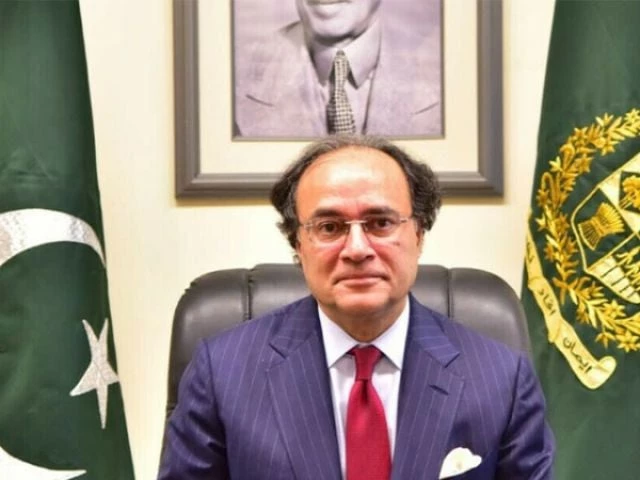Islamabad:
Finance Minister Muhammad Aurangzeb said Wednesday that Pakistan failed to develop the invested flood-related projects in favor of the $ 11 billion promised at the Geneva Conference almost three years ago, a lapse that highlights the gap between the government’s desire to secure help and its ability to effectively use it.
The minister spoke at a conference on “Building a Resilient Public Financial Management Ecosystem” organized by the Institute of Chartered Accountants of Pakistan (ICAP), on a day when heavy rain flooded parts of Punjab.
The province is facing an unprecedented flood, triggered by heavy rain and India’s release of water.
“Let’s accept that we couldn’t come up with investable projects” to make use of the billions pledged in Geneva, Aurangzeb said. He questioned whether national institutions had learned any lessons from the destruction of the floods in 2022, and again emphasized that Pakistan is facing two existential threats, climate change and the exploding population bomb.
The floods of 2022 caused damage estimated at $ 30 billion, including reconstruction costs. Aurangzeb noted that the current floods are again expected to cause billions of dollars in damage.
His comments came a day after the financial affairs the Ministry presented a report to the public accounting committee on the exploitation of flood lifters, which showed that against $ 6.4 billion promised for project financing, actual payments were only $ 2.8 billion.
The foreign lenders had committed a total of $ 11 billion, of which $ 4.6 billion was for oil financing and the remaining $ 6.4 billion had been given to spend on rehabilitation and reconstruction.
The details showed that the World Bank promised $ 2.2 billion and has so far paid out $ 1.6 billion. The Asian Development Bank obliged $ 1.6 billion, but has so far released $ 513 million. Likewise, China and the Asian Infrastructure Investment Bank (AIIB) promised $ 1.1 billion, but so far gave only $ 250 million in the absence of credible financing projects.
The Islamic Development Bank promised to give $ 600 million but released $ 231 million. The Paris Club countries promised nearly $ 800 million but released $ 139 million. The United States promised to give $ 100 million and gave $ 70 million.
Meanwhile, heavy rain in the top drainage of the Chenab River has swelled downstream streams, putting thousands of citizens at risk. Based on input from India, the Ministry of Water Resources released flood alerts for Sutlej, Ravi and Chenab Rivers.
Aurangzeb warned that unless Pakistan took the challenges of population growth and climate change seriously, it would not reach its vision of becoming a $ 3 trillion economy in 2047, the hundred anniversary of the nation’s independence.
ICAP recommendations
At the end of the conference, ICAP made recommendations to strengthen Pakistan’s public financial management.
It has recommended restructuring of the National Finance Commission Award and said the current award has given birth to unsustainable tax imbalances.
The biggest question is the expenditure, and the federal government still spends RS1.2 trillion annually on the topics that fall into the provincial domain, said Shahid Kardar, former Governor State Bank of Pakistan while spoken during the conference.
Kardar also added that the International Monetary Fund had a wrong focus on the tax-to-BNP ratio and the primary balance that ignores the issue of expenses in areas that are not the federal government’s responsibility.
The pension obligations for the federal and provincial governments have risen to a record RS33 trillion, excluding the obligations for companies such as power distribution companies, railways and Pia, Kardar said.
Muhammad Aurangzeb said the government has stopped bleeding in the first phase, from July last year, the new public sector recruits are on the basis of a contributing pension system.
The conference also recommended to strengthen FBR by freeing it from external influences. There have been many units advising FBR without real results, such as the IMF, the World Bank, ADB, Mackenzie and the United Kingdom of its transfer project.
ICAP President Saifullah said only the annual costs of tax exemptions were RS5.8 trillion, while the accumulated losses from the state-owned companies have risen to RS6 trillion.
He said the economy has stabilized, but the real questions such as SOES reforms, dissolution of circular debt and privatization remain unaddened. The fiscal buffers are weak, privatization has been stopped and the tax-to-BNP ratio is stuck at 10%.
“Our headline may sound positive, but the foundation remains shaking,” the ICAP president said.
He confirmed ICAP’s obligation to promote transparency and strengthen institutional capacity across Pakistan’s public sector.
Khalid Rahman, chairman ICAP committee and councilor of ICAP, called the ICAP conference a milestone in promoting Pakistan’s fiscal government and institutional resilience.



